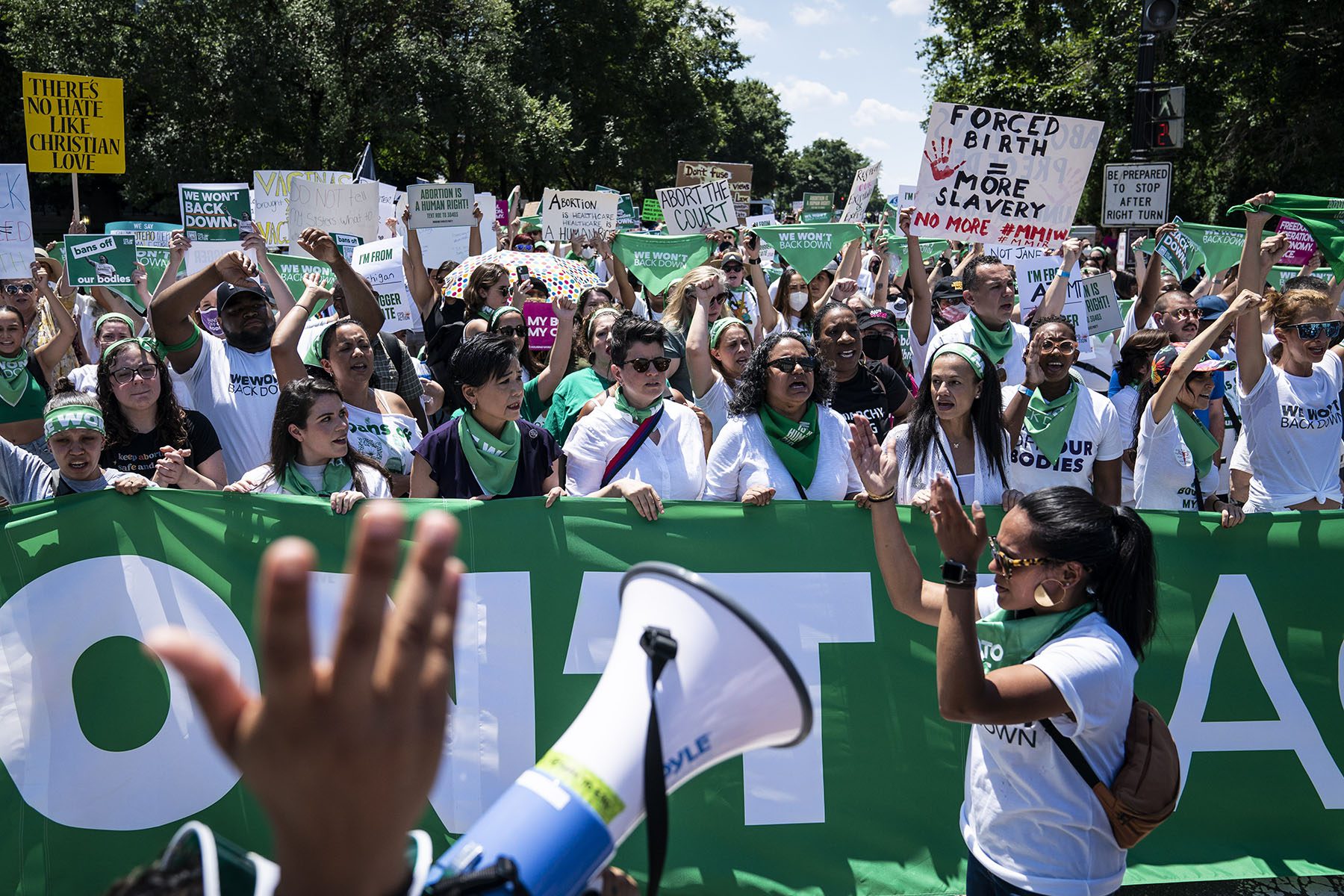We’re answering the “how” and “why” of abortion news. Subscribe to our daily newsletter.
TALLAHASSEE, Fla. — Two of the most prominent leaders in the abortion rights movement told The 19th they’re preparing to tackle future abortion bans and restrictions at the state level, efforts to undermine medication abortion and abortion access deserts as the United States enters its first full year without Roe v. Wade.
Lawmakers, officials and leading abortion rights advocates gathered in Tallahassee for a speech by Vice President Kamala Harris and an accompanying rally hosted by Planned Parenthood on Sunday. They were marking the 50th anniversary of the Supreme Court’s Roe decision that established a federal right to abortion — one that was struck down last June. Advocates said the speech’s location in Florida’s capital drew attention to Republican lawmakers’ plans to pass additional abortion restrictions in their 2023 legislative session.
Mini Timmaraju, president of NARAL Pro-Choice America, told The 19th on Sunday that the discussion of further abortion restrictions by Florida legislators and Republican Gov. Ron DeSantis “is the perfect example of how completely bonkers the right wing has become in this country.”
“I think we have to do more of this,” she said. “We have to be much more aggressive, much more in your face, we have to go to many more tough states, and say enough is enough,” Timmaraju said. “This was a good way to kick off the Roe anniversary — instead of being sad and demoralized, let’s be reinvigorated.”
Timmaraju and Alexis McGill Johnson, the president and CEO of Planned Parenthood, both pointed to the midterm elections — when three states enshrined the right to abortion into their state constitutions and anti-abortion candidates lost key races — as clear proof that harsh abortion restrictions are unpopular. They emphasized that young voters are key to the movement’s continued success.
Abortion opponents are still advocating for federal restrictions, which remain unlikely to pass with Congress divided, in addition to more abortion bans at the state level and efforts to restrict abortion pills. But they’re divided in many key states on how far to go, contributing to the legal uncertainty pervading the United States since the overturning of Roe v. Wade in June 2022.
“They were not ready for their victory,” Timmaraju said. “And they’ve been so tunnel-vision on overturning Roe for so long, it doesn’t surprise me that they’re in disarray.”
McGill Johnson told The 19th on Sunday that the midterms were “a clear inflection point” for the abortion rights movement. Still, she views the years to come not in electoral but in “movement terms.”
“This is not a two-year fight; this is a 20-year fight,” she said. “It’s important for us to be strategizing together around the kinds of bills that we need to bring not only to demonstrate the contrast with people who are going to deny us freedom at every turn, but also to start to build up what will be the statutory framework that will underpin our equality in the future.”
In the weeks and months after the Supreme Court’s decision in Dobbs v. Jackson Women’s Health, state-specific abortion bans and patients in dire situations who were denied care drew the most national attention. States where Democrats gained ground in 2022 are now working to fortify abortion access with their new majorities.
But beyond legislation, advocates are also increasingly alarmed by multi-pronged attacks by abortion opponents aiming to undermine or completely cut off access to the pills used in most first-trimester abortions.
“Medication abortion is the future of abortion access in this country, not just because of the bans, but because it’s getting better and faster,” Timmaraju said, arguing that expanded telemedicine and self-managed care “democratizes” abortion.
The Food and Drug Administration (FDA) issued new guidance in January allowing retail pharmacies to dispense mifepristone, an abortion pill approved as safe and effective that is commonly used as part of a two-pill regimen in first-trimester abortions. The move drew swift rebuke and pushback from health officials in Florida and nearly two dozen Republican attorneys general.
Anti-abortion groups have filed petitions with the FDA seeking tougher restrictions on medication abortion. And a lawsuit, deliberately filed in the court of a Trump-appointed federal judge known for his willingness to rule against the federal government, seeks to overturn the FDA’s initial approval of mifepristone, issued nearly 23 years ago.
“We should be very concerned about the impact that could have on the system, because it will affect not just Texas and Florida – it’s gonna affect the entire country,” McGill Johnson said. “And that will have a very chilling effect, and I think it is going to be an overreach if that in fact happens.”
Timmaraju said the prospect of future abortion bans combined with ongoing attacks on medication abortion is a catalyst for broadening their movement, especially for bringing more young women into it.
“The target demographic of women most affected by these bans are 18 to 35,” she said. “We need more of them at the forefront of the movement.”
McGill Johnson echoed that sentiment, arguing the movement should both “bring more people into the space” and engage “people who don’t traditionally engage in fights around reproductive rights,” including corporate leaders.
Advocates see the burgeoning attacks on widely used abortion pills as a catalyst.
“There’s a lot of conversations in our coalition about how we take this inflection point on medication abortion, and make it another opportunity to educate the American people,” Timmaraju said. “And I think the vice president just did it so brilliantly today, but it’s going to take all of us at various levels.”
Harris said in her remarks Sunday that attacks on medication abortion jeopardize patients in blue states and places where abortion is protected. President Joe Biden included protecting medication abortion in an executive order issued two weeks after the Dobbs decision and issued a new memorandum Sunday directing the attorney general and Department of Health and Human Services to “consider new guidance to support patients, providers, and pharmacies” and bolster patient privacy.
Mary Ziegler, a law professor and scholar of abortion at University of California-Davis and Aziza Ahmed, a professor of law at Boston University, wrote in a CNN op-ed that the FDA decision allowing pharmacies to dispense medication abortion also underscores the importance of Biden and not a Republican president being in office.
“In a different administration,” they wrote,” both the DOJ and FDA might target abortion pills, and that means your vote for who sits in the White House matters more than you think.”
Even as some states have codified access, advocates argue that alone doesn’t make abortion accessible.
“The danger of focusing too much just on Roe and restoring Roe is that Roe was always about fundamental rights,” Timmaraju said. “It didn’t protect access, which is how it got so weak.”
In addition to fighting abortion bans, Timmaraju and other advocates are pushing states where the procedure is legally protected to put more funds and resources behind expanding abortion access, particularly for low-income patients and those living in states where abortion is banned. Timmaraju pointed to California, which passed several new abortion protections and put $200 million toward expanding abortion services in 2022, as the “gold standard.”
“We want all the states that have codified access or have protected the right to dig deeper into the access crisis of their state,” she said.
The Supreme Court overturning Roe sent a lightning bolt through many Americans. And for leaders Timmaraju and McGill Johnson, the challenge ahead is taking the rise in engagement and momentum sparked by the decision to build a long-term movement.
“We as national, state and local organizations need to find a way to make these folks forever repro activists, not just occasional voters,” Timmaraju said.







